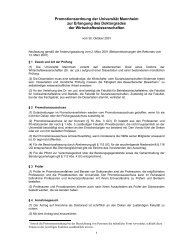The returns to cognitive and non-cognitive abilities in Germany
The returns to cognitive and non-cognitive abilities in Germany
The returns to cognitive and non-cognitive abilities in Germany
Create successful ePaper yourself
Turn your PDF publications into a flip-book with our unique Google optimized e-Paper software.
furthermore needs some familiarity with the relevant psychological literature which usually<br />
is not the case for the ma<strong>in</strong>stream tra<strong>in</strong>ed economist.<br />
Yet, similar <strong>to</strong> <strong>cognitive</strong> skills, <strong>in</strong>dividuals’ personality may likewise result <strong>in</strong> job<br />
performance differentials. Behavioral characteristics such as perseverance or trustworth<strong>in</strong>ess<br />
are traits that may be helpful <strong>in</strong> both employer-employee <strong>and</strong> cus<strong>to</strong>mer relationships while<br />
other traits such as aggression or passivity might be undesirable <strong>and</strong> hence not be rewarded<br />
or even be punished <strong>in</strong> the labor market. Bowles et al. (2001) take up a dem<strong>and</strong> side po<strong>in</strong>t of<br />
view <strong>and</strong> argue <strong>in</strong> what they call an <strong>in</strong>centive-enhanc<strong>in</strong>g framework that employers may<br />
reward employee characteristics that enable them <strong>to</strong> elicit effort at low costs. From the<br />
<strong>in</strong>dividuals’, i.e. supply side po<strong>in</strong>t of view, Mueller und Plug (2006) as well as Heckman et<br />
al. (2006) <strong>and</strong> Borghans et al. (2008) argue that differences <strong>in</strong> skills <strong>and</strong> differences <strong>in</strong><br />
preferences may exert direct <strong>and</strong> <strong>in</strong>direct effects on productivity: a) Directly, personality –<br />
<strong>and</strong> thereby implicitly assum<strong>in</strong>g its effects on behavior – might be thought of as part of an<br />
<strong>in</strong>dividual’s set of productive traits just as general or specific education or job-related<br />
tra<strong>in</strong><strong>in</strong>g. b) Individuals’ personality may furthermore affect labor market success <strong>in</strong>directly<br />
through the type of school<strong>in</strong>g <strong>and</strong> occupation chosen. It consequently is unsurpris<strong>in</strong>g that the<br />
exist<strong>in</strong>g evidence suggests a <strong>non</strong>-trivial relationship between <strong>in</strong>dividuals’ personality traits<br />
<strong>and</strong> labor market success as measured by earn<strong>in</strong>gs. Depend<strong>in</strong>g on the particular personality<br />
trait measure, the magnitude of this association is comparable <strong>to</strong> or even greater than the<br />
effects of <strong>cognitive</strong> <strong>abilities</strong> (Bowles et al., 2001; Heckman et al., 2006; Mueller <strong>and</strong> Plug,<br />
2006).<br />
While the effect of either <strong>in</strong>telligence or personality on earn<strong>in</strong>gs have so far ma<strong>in</strong>ly<br />
been exam<strong>in</strong>ed for the US <strong>and</strong> the UK, our study adds <strong>to</strong> the literature provid<strong>in</strong>g evidence<br />
for <strong>Germany</strong>. <strong>The</strong>re are only three prior studies that similarly address the impact of either<br />
<strong>cognitive</strong> skills (Anger <strong>and</strong> He<strong>in</strong>eck, 2008) or personality (Flossmann et al., 2007; Dohmen<br />
3















